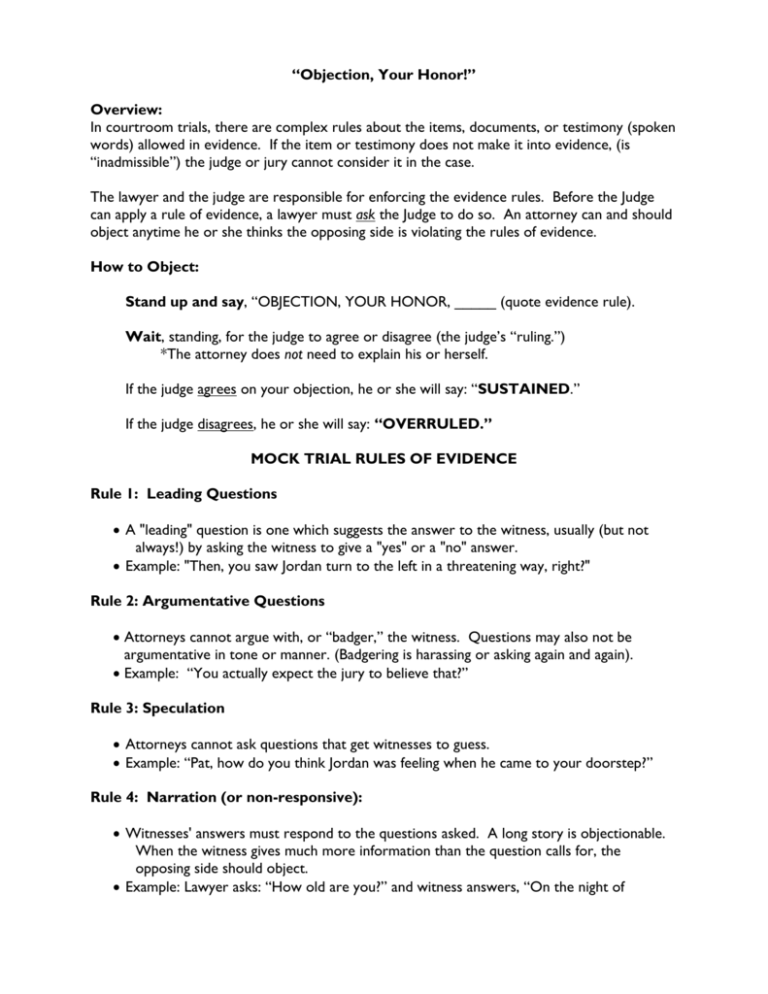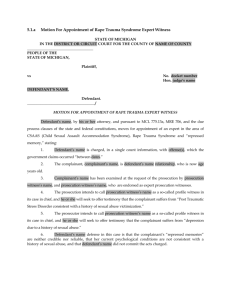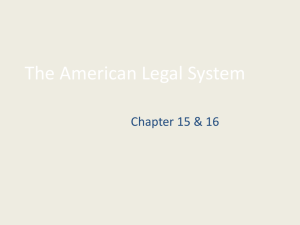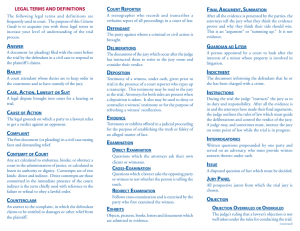Word document
advertisement

“Objection, Your Honor!” Overview: In courtroom trials, there are complex rules about the items, documents, or testimony (spoken words) allowed in evidence. If the item or testimony does not make it into evidence, (is “inadmissible”) the judge or jury cannot consider it in the case. The lawyer and the judge are responsible for enforcing the evidence rules. Before the Judge can apply a rule of evidence, a lawyer must ask the Judge to do so. An attorney can and should object anytime he or she thinks the opposing side is violating the rules of evidence. How to Object: Stand up and say, “OBJECTION, YOUR HONOR, _____ (quote evidence rule). Wait, standing, for the judge to agree or disagree (the judge’s “ruling.”) *The attorney does not need to explain his or herself. If the judge agrees on your objection, he or she will say: “SUSTAINED.” If the judge disagrees, he or she will say: “OVERRULED.” MOCK TRIAL RULES OF EVIDENCE Rule 1: Leading Questions A "leading" question is one which suggests the answer to the witness, usually (but not always!) by asking the witness to give a "yes" or a "no" answer. Example: "Then, you saw Jordan turn to the left in a threatening way, right?" Rule 2: Argumentative Questions Attorneys cannot argue with, or “badger,” the witness. Questions may also not be argumentative in tone or manner. (Badgering is harassing or asking again and again). Example: “You actually expect the jury to believe that?” Rule 3: Speculation Attorneys cannot ask questions that get witnesses to guess. Example: “Pat, how do you think Jordan was feeling when he came to your doorstep?” Rule 4: Narration (or non-responsive): Witnesses' answers must respond to the questions asked. A long story is objectionable. When the witness gives much more information than the question calls for, the opposing side should object. Example: Lawyer asks: “How old are you?” and witness answers, “On the night of September 10th, I was with my friends and we were going to a movie, and…” Rule 5: Relevance Questions or answers that add nothing to the understanding of the issue in dispute are objectionable. Example: In a bankruptcy trial, it would probably be irrelevant that the defendant cheated on his wife. Rule 6: Hearsay With certain exceptions, statements that are made outside of the courtroom are not allowed as evidence if they are offered in court to show that the statements are true. Example: From witness: “Ms. Gerson told me that Pat bought a gun.” From lawyer: “What did he tell you?” Rule 7: Beyond the Scope of the Packet (not a real objection in a real trial!) Questions that ask about, or answers that supply, important facts not contained in the packet are objectionable. However, minor details regarding a character's role may be asked and added. Example: “Actually, we did find a knife in Jordan’s pocket.” Name: ______________________________________ Cross Examination: Prosecution Unlike direct examination, the witness is not the “star” on cross exam. The lawyer is! Because the witness may have things that “hurt” your client or your case, the point of cross examination is to limit the witness’s testimony to statements that help our case, and to prevent the witness from talking about anything else. Questions on cross examination should be short, “leading” (drawing out a “yes” or “no” rather than a long explanation), and support specific conclusions you want the jury to make. You are really making an argument through the witness on cross. Working in pairs, brainstorm some overall ideas you want the jury to take away from the defendant’s testimony on cross-examination. Then, draft the questions you would ask the defendant to support those ideas. Example Argument: The defendant could have just closed the door and called the police rather than shooting Jordan. Example Questions: 1. 2. 3. 4. 5. 6. 7. 8. You opened the door before Jordan knocked, isn’t that right? And Jordan never tried to enter the house? He never said he would enter the house? Jordan never stepped up onto your porch? In fact, Jordan stayed twelve feet away the whole time you were arguing? But you never tried to close the door? You never tried to walk away? Instead, you shot your gun? Takeaway: This line of questioning should support the theory that shooting Jordan was not reasonable, because Jordan was not a physically threat to the defendant. Argument # 1: _______________________________________________________________ Questions: 1. ____________________________________________________________________ 2. ____________________________________________________________________ 3. ____________________________________________________________________ 4. ____________________________________________________________________ 5. ____________________________________________________________________ Argument # 2: _______________________________________________________________ Questions: 1. ____________________________________________________________________ 2. ____________________________________________________________________ 3. ____________________________________________________________________ 4. ____________________________________________________________________ 5. ____________________________________________________________________ Name: ______________________________________ Closing Statement Preparation Form: Prosecution 1. HOOK: Go back to theme and theory “As we told you in opening statement, this is a case about __________________ ___________________________________________________________________.” 2. ELEMENTS of Murder “The defendant does not dispute that she intentionally shot and killed Jordan Davis. Under Washington law, this is murder. In Washington, the defendant is guilty of murder if she (fill in the elements): ______________________________________________________________________ _____________________________________________________________________.” “And we have proven this with evidence. (List evidence: diagrams, testimony, etc.) ______________________________________________________________________ _____________________________________________________________________.” 3. REBUT the Elements of Self-Defense If the defense proves that Pat Haines acted in self-defense, the prosecution will lose the case. So you must disprove the elements of self-defense. Point to exactly what they failed to prove: “The defense tried to tell you that Pat Haines was acting in self-defense. But let’s look at the elements of self-defense. They are____________...” 1. 2. 3. .” 4. Appeal to COMMON SENSE Emphasize what makes sense in this case. The way normal people act. The way people are expected to act. The way any one of us would have acted in that situation. ______________________________________________________________________ ______________________________________________________________________. 5. That is why we ask you to return a verdict of GUILTY. Thank you. Name: ______________________________________ Closing Statement Preparation Form: Defense 1. HOOK: Go back to theme and theory “As we told you in opening statement, this is a case about __________________ ___________________________________________________________________.” 2. Importance of the BURDEN OF PROOF “Beyond a reasonable doubt” is the highest burden of proof. If the jury has any reasonable doubts that the defendant did not intend to kill Jordan Davis, they cannot convict her of murder. WHY is this important to our justice system? 3. The Prosecution did not prove the ELEMENTS (of murder) BRD. “The Prosecution must have proven each element of (the charge) ____________ _________________________________________________________________________ (burden of proof) ________________________________________________________.” 4. Argue SELF-DEFENSE: “Even if the prosecution proves the elements of murder beyond a reasonable doubt, the defense still prevails if it proves all of the elements of self-defense. The elements of selfdefense are: 1. 2. 3. .” “And we have proven this with evidence. (List Evidence: Diagrams, Testimony, etc.). ______________________________________________________________________ _____________________________________________________________________.” 4. The prosecution has FAILED to rebut the elements of self-defense. Point to exactly what they failed to prove: _____________________________________ ______________________________________________________________________. 6. That is why we ask you to return a verdict of NOT GUILTY. Thank you.







